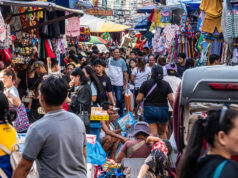Hot money enters in June, flees in 1st half
By Melissa Luz T. Lopez, Senior Reporter
MORE FLIGHTY foreign capital entered the country in June on the back of investor confidence with legislative approval of the first tax reform package and “accelerated” net foreign buying at the Philippine Stock Exchange (PSE), the Bangko Sentral ng Pilipinas (BSP) reported yesterday.
But June’s net inflow was not able to prevent the six-month tally to slip to a net outflow from a net inflow recorded in 2016’s first half.
Foreign portfolio investments yielded a $79.56-million net inflow last month, recovering from May’s $24.35-million net outflow but still dwarfed by the $450.87-million net inflow in June 2016.
Such investments are often called “hot money” given the ease by which these funds enter and leave markets, versus the more stable foreign direct investments.
The Philippines got $2.016 billion in aggregate inflows last month, 35.77% more than May’s $1.285 billion and 11.41% more than June 2016’s $1.81 billion.
Outflows totaled some $1.937 billion last month, 28.31% more than May’s $1.509 billion and 42.52% more than June 2016’s $1.359 billion.
Net inflows in June’s first two weeks offset outbound capital as the month drew to a close, central bank showed.
“This may be attributed to positive investor sentiment relative to the anticipated resolution of the conflict in Marawi City, accelerated net foreign buying, and approval by Congress of the first tax reform package,” the BSP said in a statement yesterday.
On May 31, the House of Representatives approved on third and final reading its version of the tax reform bill, which seeks to reduce personal income taxes while raising fresh revenues from higher excise levies on fuel, cars and sugar-sweetened drinks. The reform is now in the Senate, which has questioned moves to remove value added tax exemption of lower housing segments and of cooperatives, among other concerns. The Finance department wants to implement these tax adjustments by January 2018.
About 82% of capital inflows went to PSE-listed firms — mostly to shares of holding firms, property companies, telecommunications firms, banks and utilities — yielding $311-million net inflows.
About 17.2% went to peso-denominated government securities while the 0.8% balance went to other peso-denominated debt papers, yielding a $247-million net outflow and a $16 million net inflow, respectively.
Investors also anticipated the end of conflict in Marawi City between government forces and hundreds of militants who had pledged allegiance to the Islamic State, the BSP said.
Clashes in that central Mindanao city have been raging for nearly two months since they erupted on May 23.
The 60-day martial law proclamation covering the entire Mindanao that was declared after the Marawi conflict erupted is set to expire on July 22.
The government has yet to declare Marawi as completely free of terrorists, but President Rodrigo R. Duterte had said last Tuesday that he expected the crisis to lift in “10-15 days”.
The peso also returned above the P50 level versus the dollar since June 20 and has since been trading at 10-year lows.
OUTFLOWS IN FIRST HALF
Despite hot money’s recovery in June, the first semester still saw a $460.83-million net outflow, reversing from the $593.87-million net inflow recorded in 2016’s comparable six months.
The central bank said this reflected heightened market uncertainty due to local and international developments like the Department of Environment and Natural Resources’ crackdown in February on several mining projects and interest rate increases in the United States in March and June.
The United States, the United Kingdom, Singapore, Malaysia, and Luxembourg were the biggest sources of foreign funds in June, accounting for a cumulative 80.1%.
The US continued to be the main destination of outflows, getting 64.7% of the total.
OUTLOOK
“Robust economic growth and manageable inflation that are supported by appropriate fiscal and monetary policies coupled with healthy corporate earnings will help attract more foreign portfolio capital into the country,” said Angelo B. Taningco, economist at Security Bank Corp., adding that “progress in tax reform deliberations and infrastructure spending in the upcoming months will be a boost to foreign investor sentiment, and delays on these two could pose a concern or challenge in encouraging foreign portfolio investments.”
The central bank expects hot money to post a $900-million net outflow this year, reversing a $404.43-million inflow in 2016, according to latest official estimates announced last month.



